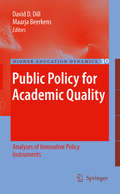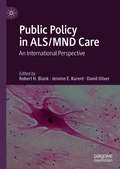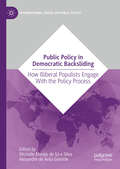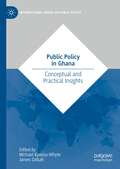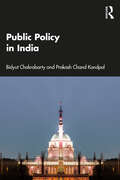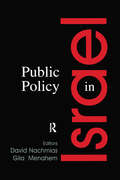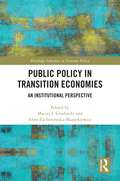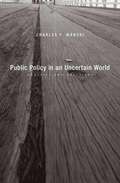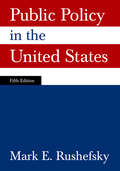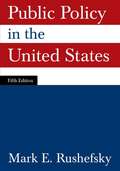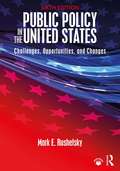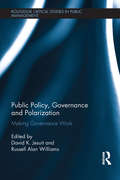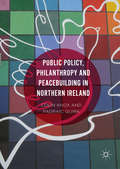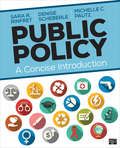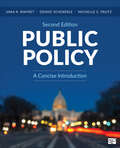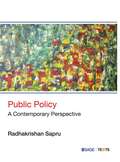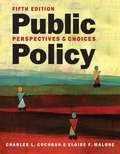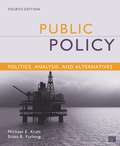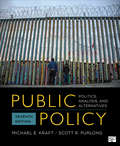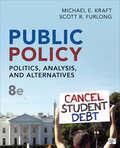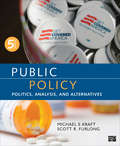- Table View
- List View
Public Policy for Academic Quality
by Maarja Beerkens David D. DillOver the last decade the structure of higher education in most countries has undergone significant change brought about by social demands for expanded access, technological developments, and market forces. In this period of change the traditional concerns with access and cost have been supplemented by a new concern with academic quality. As a consequence, new public policies on academic quality and new forms of academic quality assurance have rapidly emerged and swiftly migrated across continents and around the globe. The growing public debate about academic quality assurance within and across countries however has not always been well informed by analyses of the strengths and weaknesses of these new policy instruments. The Public Policy for Academic Quality Research Program (PPAQ) was designed to provide systematic analyses of innovative external quality assurance policies around the world. This volume presents the fourteen analyses of national policies on academic quality assurance conducted as part of the PPAQ Research Program utilizing the knowledge of informed international scholars. Each policy analysis examines the policy goals, implementation problems, and impacts of these newly developed national quality assurance instruments. The book concludes with an assessment of the lessons learned from these collected policy analyses and outlines the framework conditions that appear essential for assuring academic standards in the university sector.
Public Policy in ALS/MND Care: An International Perspective
by David Oliver Robert H. Blank Jerome E. KurentThis book focuses on the public policy and political/ethical dimensions of ALS/MND across a wide selection of countries and argues for the need of a multidisciplinary and international approach. Policy issues addressed include adequacy of funding for research and care, payment policy and regulatory functions of public and private insurers, long-term services and caregiver support, public health and prevention efforts, access to genetic testing and assisted technologies, ensuring a competent and adequate workforce especially for hands-on caregivers, and the challenging issues of providing palliative and hospice care for ALS/MND patients, advance directives and assisted suicide that face policy makers in all political jurisdictions.
Public Policy in Democratic Backsliding: How Illiberal Populists Engage with the Policy Process (International Series on Public Policy)
by Michelle Morais de Sá e Silva Alexandre de Ávila GomideThis book examines the impact of democratic backsliding and populist governments on the public policy process. Drawing on case studies from the USA, Brazil, Hungary, Mexico, Poland, Turkey, and the Philippines, it assesses how elected populist governments have eroded policy capabilities and dismantled state apparatuses responsible for making and implementing policy. The book offers a unique perspective into democratic backsliding through a public policy lens, and considers why, when and how policy processes change as a result of populist governments. Numerous policy issues are analysed throughout the volume, including environmental, health and economic policies. It will appeal to all those interested in public policy, democracy studies, and public administration.
Public Policy in Ghana: Conceptual and Practical Insights (International Series on Public Policy)
by Michael Kpessa-Whyte James DzisahThis book provides analytical, conceptual, and practical insights into how public policy processes and outcomes are conceptualized and framed. Drawing on Ghanaian experiences, but with extensive illustrations from other African countries, it showcases issues of commonality and diversity in public policy with analytical insights and real-life policy concerns that specifically address how citizens engage with the state, and how they think and function as social actors within the socio-cultural settings of Africa. The book brings public policy to life as a practical and problem-solving discipline, with examples of how policy actors such as the legislature, governance architects, the media, and the judiciary become arenas for contest. Linking public policy to development paradigms, governance, and responsible citizenship, it is important reading for students and scholars of public policy, governance, and politics in Africa, as well as practitioners.
Public Policy in India
by Bidyut Chakrabarty Prakash Chand KandpalThis textbook is a comprehensive, student-friendly guide to public policy in India. It highlights the critical aspects of public policy-making and its implementation by contextualizing it in the Indian historical and modern-day perspective. Public Policy in India: • Provides lucid explanations of theoretical aspects of public policy and its practice in the Indian context; • Captures the complexities in making, implementing and evaluating public policy; • Studies the dialectical interconnection that public policy has with the socio-economic and political environment; • Highlights the influence of culture on public policy; and • Analyses public policy as an outcome of a very complex contextual dialogue involving various kinds of actors. Accessibly written, this book covers a range of university syllabi and will be essential reading for students and researchers of political science and public administration. It will also be indispensable for civil service examinations, including the UPSC.
Public Policy in Israel (Israeli History, Politics and Society #Vol. 17)
by David Nachmias Gila MenahemAn examination of the current Israeli government, covering public policies such as health, housing and transport. The volume covers the institutional as well as the political and the bureaucratic framework within which public policies have been made and implemented.
Public Policy in Transition Economies: An Institutional Perspective (Routledge Advances in Economic Policy)
by Maciej J. Grodzicki Anna Zachorowska-MazurkiewiczPublic policies are usually carefully designed to address a particular problem, but they are also shaped and influenced by the sociocultural heritage of a particular country. This volume explores the origins of economic and other public policies in Central and Eastern Europe.This region makes for a particularly interesting case because after going through a major system change – transitioning from a command economy into a market economy – many of the key policies were written anew. The contributors to this book look at key policy areas at the intersection of state and private sectors, including industrial, pension, energy, and competition policies. The chapters examine key questions such as: how did these policies evolve from the time of transition to their final form? What were the main drivers of policy conduct and factors influencing major policy choices? How does the historical context impact contemporary policy space? Throughout the volume, an institutional approach is adopted, according to which policies are perceived as the outcome of top‑down design, filtered through social institutions inherited from the past. With this approach, this book presents a long‑running assessment, over 30 years, of policymaking in transition economies, which were subject to profound changes throughout the period.This book will be of interest to readers in institutional economics, policy studies, transition economies, and the recent history of Eastern Europe.
Public Policy in an Uncertain World
by Charles F. ManskiPublic policy advocates routinely assert that research has shown a particular policy to be desirable. But how reliable is the analysis in the research they invoke? And how does that analysis affect the way policy is made, on issues ranging from vaccination to minimum wage to FDA drug approval? Charles Manski argues here that current policy is based on untrustworthy analysis. By failing to account for uncertainty in an unpredictable world, policy analysis misleads policy makers with expressions of certitude. Public Policy in an Uncertain World critiques the status quo and offers an innovation to improve how policy research is conducted and how policy makers use research. Consumers of policy analysis, whether civil servants, journalists, or concerned citizens, need to understand research methodology well enough to properly assess reported findings. In the current model, policy researchers base their predictions on strong assumptions. But as Manski demonstrates, strong assumptions lead to less credible predictions than weaker ones. His alternative approach takes account of uncertainty and thereby moves policy analysis away from incredible certitude and toward honest portrayal of partial knowledge. Manski describes analysis of research on such topics as the effect of the death penalty on homicide, of unemployment insurance on job-seeking, and of preschooling on high school graduation. And he uses other real-world scenarios to illustrate the course he recommends, in which policy makers form reasonable decisions based on partial knowledge of outcomes, and journalists evaluate research claims more closely, with a skeptical eye toward expressions of certitude.
Public Policy in the United States
by Mark E RushefskyThe fifth edition of this well-regarded text covers the period up through the 2012 elections. It has been revised to make it sleeker, more concise, and up-to-date with a clear organisational structure.This edition accomplishes these three important goals:First, it introduces readers to the American approach to public policy making as it has been shaped by our political institutions, changing circumstances, and ideology.Second, it surveys American public policy and policymaking in all the major policy areas from economic policy to health care policy to environmental policy, and does so clearly and even-handedly, with well-selected illustrations, case studies, terms, and study questions.Finally, in addition to providing analytical tools and empirical information, the book challenges readers to come to terms with the widely shared but often competing values that must be balanced and rebalanced in the ongoing policy making process, affecting issues of the highest concern to the American public.
Public Policy in the United States
by Mark E. RushefskyThe fifth edition of this well-regarded text covers the period up through the 2012 elections. It has been revised to make it sleeker, more concise, and up-to-date with a clear organisational structure. This edition accomplishes these three important goals: First, it introduces readers to the American approach to public policy making as it has been shaped by our political institutions, changing circumstances, and ideology. Second, it surveys American public policy and policymaking in all the major policy areas from economic policy to health care policy to environmental policy, and does so clearly and even-handedly, with well-selected illustrations, case studies, terms, and study questions. Finally, in addition to providing analytical tools and empirical information, the book challenges readers to come to terms with the widely shared but often competing values that must be balanced and rebalanced in the ongoing policy making process, affecting issues of the highest concern to the American public.
Public Policy in the United States: Challenges, Opportunities, and Changes
by Mark E. RushefskyOffering the widest breadth of policy issue coverage on the market, the sixth edition of this well-regarded text covers events through the 2016 elections and beyond. Though the content has been extensively and thoughtfully revised and updated, the sixth edition maintains its clear approach, without an overreliance on policy theory, and popular threefold structure: First, it introduces readers to the American approach to public policy making as it has been shaped by our political institutions, changing circumstances, and ideology. Second, it surveys all of the major policy areas from foreign policy to health care policy to environmental policy, and does so with well-selected illustrations, case studies, terms, and study questions. Third, it provides readers with analytical tools and frameworks to examine current problems and be able to understand and critique proposed public policy solutions. New to the sixth edition is an exploration of: The Affordable Care Act and its implementation, controversies, and impact The American economy since the end of the Great Recession, trade policy, and economic equality issues Foreign policy including relations with Russia, China, and Iran, as well as the civil war in Syria, the continuing conflicts in Iraq, and the challenge of ISIS The US Criminal Justice system and its incarceration challenges as well as issues of minorities, police, and crime. This new edition includes, for the first time, a test bank with multiple choice, short answer, and discussion/essay questions as well as an instructor’s manual. Public Policy in the United States, 6e is an ideal undergraduate text for introductory courses on American Public Policy and Politics, and can be used as supplementary reading in undergraduate courses on policy process, policy analysis, and American government.
Public Policy, Governance and Polarization: Making Governance Work (Routledge Critical Studies in Public Management)
by David K. Jesuit and Russell Alan WilliamsPolarization is widely diagnosed as a major cause of the decline of evidence-based policy making and public engagement-based styles of policy making. It creates an environment where hardened partisan viewpoints on major policy questions are less amenable to negotiation, compromise or change. Polarization is not a temporary situation – it is the “new normal.” Public Policy, Governance and Polarization seeks to provide a theoretical foundation for scholars and policy makers who need to understand the powerful and often disruptive forces that have arisen in Europe and North America over the past decade. Academics and practitioners need to better understand this growing trend and to find ways in which it may be managed so that policy solutions to these threats may be developed and implemented. Researchers and future policymakers in fields such as public administration, public management and public policy need to recognise how institutional design, corporatist interest group systems and different pedagogical approaches may help them understand, discuss and work beyond policy polarization. Edited by two leading political science scholars, this book aims to begin that process.
Public Policy, Philanthropy and Peacebuilding in Northern Ireland
by Colin Knox Padraic QuirkThis book examines the role playedby one important external stakeholder, Atlantic Philanthropies, a limited-lifefoundation, in helping to build peace and promote reconciliation in NorthernIreland. Northern Ireland is now referred to as a post-conflict society largelydue to the absence of political violence and relatively stable politicalinstitutions. These are necessary but insufficient conditions for what Galtunghas described as 'positive peace', which requires a more fundamental review ofthe structural inequalities that contributed to the conflict in the first place. Using detailed case studies the authors illustrate the role played by voluntaryand community sector groups, funded by Atlantic Philanthropies, in influencingthe public policy agenda and securing long term systemic changes. They alsocritique the work of Atlantic as a 'pay to play' organization whose originalmission moved from funding the higher education sector on the island of Irelandto become a key foundation with a significant role in the peace process.
Public Policy: A Concise Introduction (American Governance And Public Policy Ser.)
by Sara R. Rinfret Michelle C. Pautz Professor Denise L. ScheberlePublic Policy: A Concise Introduction, by Sara R. Rinfret, Denise Scheberle, and Michelle C. Pautz, is a student-friendly primer that quickly connects readers to the inner workings of public policy. The text condenses early chapters on theory and the policy-making process, allowing students to take up key policy challenges—such as immigration, education, and health care—much earlier in the semester. Structured chapter layouts of substantive policy areas allow instructors to supplement with their own examples seamlessly. The book’s emphasis on policy choices asks students to look beyond simple pros and cons to examine the multifaceted dimensions of decision making and the complexities inherent in real-world problem solving. Not every student starts out engaged in public policy, so place your students—both majors and non-majors alike—in the driver’s seat by fostering their analytical skills early, and spend the rest of the semester discussing policy issues, examining data, and debating current policy examples that matter most to them.
Public Policy: A Concise Introduction (American Governance And Public Policy Ser.)
by Sara R. Rinfret Michelle C. Pautz Professor Denise L. ScheberlePublic Policy: A Concise Introduction, by Sara R. Rinfret, Denise Scheberle, and Michelle C. Pautz, is a student-friendly primer that quickly connects readers to the inner workings of public policy. The text condenses early chapters on theory and the policy-making process, allowing students to take up key policy challenges—such as immigration, education, and health care—much earlier in the semester. Structured chapter layouts of substantive policy areas allow instructors to supplement with their own examples seamlessly. The book’s emphasis on policy choices asks students to look beyond simple pros and cons to examine the multifaceted dimensions of decision making and the complexities inherent in real-world problem solving. Not every student starts out engaged in public policy, so place your students—both majors and non-majors alike—in the driver’s seat by fostering their analytical skills early, and spend the rest of the semester discussing policy issues, examining data, and debating current policy examples that matter most to them.
Public Policy: A Concise Introduction (Public Administration For Public Health Ser.)
by Sara R. Rinfret Denise L. Scheberle Michelle C. PautzPublic Policy: A Concise Introduction, Second Edition by Sara R. Rinfret, Denise Scheberle and Michelle C. Pautz, is a student-friendly textbook that connects responsible citizens to the world through a contemporary examination of the fundamentals of American public policy. The authors help both majors and non-majors foster their analytical skills early and then spend the rest of the semester discussing the policy issues, data, and events that matter most to them. The Second Edition has been updated to include how we can collectively use public policy to raise individuals from the margins and address inequities that exist in our system. Recent policy questions include: "How do we shape our country′s health care system?", "How do we address increases in costs of tuition?", and "Did the COVID-19 pandemic positively or negatively shape our public education system?"
Public Policy: A Concise Introduction (Public Administration For Public Health Ser.)
by Sara R. Rinfret Denise L. Scheberle Michelle C. PautzPublic Policy: A Concise Introduction, Second Edition by Sara R. Rinfret, Denise Scheberle and Michelle C. Pautz, is a student-friendly textbook that connects responsible citizens to the world through a contemporary examination of the fundamentals of American public policy. The authors help both majors and non-majors foster their analytical skills early and then spend the rest of the semester discussing the policy issues, data, and events that matter most to them. The Second Edition has been updated to include how we can collectively use public policy to raise individuals from the margins and address inequities that exist in our system. Recent policy questions include: "How do we shape our country′s health care system?", "How do we address increases in costs of tuition?", and "Did the COVID-19 pandemic positively or negatively shape our public education system?"
Public Policy: A Contemporary Perspective
by Radhakrishan SapruThe book presents an extensive treatment of the nature, scope and significance of public policies, their implementation and policy analysis. This refreshing new textbook covers the basic and introductory aspects of public policy along with the new realities in public policy formulation and analysis. It also provides a critical insight into the works of leading scholars in the field. Through examples and real-life incidents from different countries, the author effectively discusses theoretical, structural and practical aspects of formulation, implementation, monitoring and evaluation of public policies. With chapters on the role of think tanks, decision-making process and policy sciences, this book would meet the growing needs of the students as well as civil services aspirants. Key Features • Analytical approach in examining the fundamental themes and key issues in public policy-making • Special focus on policy advocacy, significance of intergovernmental relations and institutionalism and policy monitoring • Major theories of agenda analysis, decision-making process and policy implementation explained in an easy-to-understand manner • Each chapter aided by examples, case studies and review questions • Ideal and must-have companion for students of political science and public administration, as well as UGC NET and civil services aspirants
Public Policy: Perspectives and Choices (5th Edition)
by Charles L. Cochran Eloise F. MaloneThis new edition of Public Policy: Perspectives and Choices thoroughly revised to reflect a half-decade of significant changes in the policy environment is designed to give students the tools that they need to analyze and assess the nation's public policies for years to come. The authors combine a clear explanation of the basic concepts and methods of the policymaking process with a keen focus on how values influence policy choices. They then apply this foundation to a range of policy areas. The fully updated text: presents complicated ideas in an accessible way; engages with controversies, bringing the study of public policy alive; draws on a wealth of real world examples; provides balanced consideration of liberal and conservative policy positions; and emphasizes the relationship between individual and national interests. The result is an ideal combination of theory and practice for effectively teaching public policy.
Public Policy: Politics, Analysis, And Alternatives, 4th Edition
by Michael E. Kraft Scott R. FurlongAll too often, public policy textbooks offer a basic grounding in the policy process without the benefit of integrating the use of policy analysis. Kraft and Furlong, since their first edition, take a different tack. They want students to understand how and why policy analysis is used to assess policy alternatives-not only to question the assumptions of policy analysts, but to recognize how analysis is used in support of political arguments. To encourage critical and creative thinking on issues ranging from the financial bailout to rising gas prices to natural disasters, the authors introduce and fully integrate an evaluative approach to policy. Public Policy starts with a concise review of institutions, policy actors, and major theoretical models. The authors then discuss the nature of policy analysis and its practice, and show students how to employ evaluative criteria in six substantive policy areas. Public Policy arms students with analytic tools they need to understand the motivations of policy actors-both within and outside of government-influence a complex, yet comprehensible, policy agenda. Enhancements to the 4th edition: - All chapters have been comprehensively updated to include recent events, issues, and policy debates including the conduct of the wars in Afghanistan and Iraq, the use of private contractors for military support and operations, the rising cost of gasoline and disputes over energy policy and climate change, the controversy over immigration policy, requirements for financial regulation, heightened concerns over economic and social inequality, and the clash over reforming taxes and entitlement programs, as well as dealing with the federal deficit and national debt. - New and updated working with sources and steps to analysis features help students investigate sources of information and apply evaluative criteria. - New and updated end-of chapter discussion questions, suggested readings, and web sites.
Public Policy: Politics, Analysis, and Alternatives
by Michael E. Kraft Scott R. FurlongWith the right information, we can develop public policies that work better. All too often, public policy textbooks offer a basic grounding in the policy process without the benefit of integrating the use of policy analysis. Michael E. Kraft and Scott R. Furlong take a different tack. Public Policy: Politics, Analysis, and Alternatives, Seventh Edition helps students understand how and why policy analysis is used to assess policy alternatives. The text encourages them to not only question the assumptions of policy analyst, but also recognize how these strategies are used in the support of political arguments. The authors introduce and fully integrate an evaluative approach to policy to encourage critical and creative thinking on issues ranging from health care to climate change. From a concise review of institutions, policy actors, and major theoretical models to a discussion of the nature of policy analysis and its practice, Kraft and Furlong show students how to employ evaluative criteria in six substantive policy areas. Students come away with the analytic tools they need to understand that the motivations of policy actors—both within and outside of government—influence a complex yet comprehensible policy agenda.
Public Policy: Politics, Analysis, and Alternatives
by Michael E. Kraft Scott R. FurlongWith the right information, we can develop public policies that work better. All too often, public policy textbooks offer a basic grounding in the policy process without the benefit of integrating the use of policy analysis. Michael E. Kraft and Scott R. Furlong take a different tack. Public Policy: Politics, Analysis, and Alternatives, Seventh Edition helps students understand how and why policy analysis is used to assess policy alternatives. The text encourages them to not only question the assumptions of policy analyst, but also recognize how these strategies are used in the support of political arguments. The authors introduce and fully integrate an evaluative approach to policy to encourage critical and creative thinking on issues ranging from health care to climate change. From a concise review of institutions, policy actors, and major theoretical models to a discussion of the nature of policy analysis and its practice, Kraft and Furlong show students how to employ evaluative criteria in six substantive policy areas. Students come away with the analytic tools they need to understand that the motivations of policy actors—both within and outside of government—influence a complex yet comprehensible policy agenda.
Public Policy: Politics, Analysis, and Alternatives
by Michael E. Kraft Scott R. FurlongWith the right information, we can develop public policies that work better. Public Policy: Politics, Analysis, and Alternatives, Eighth Edition helps students understand how and why policy analysis is used to assess policy alternatives. The text encourages them to not only question the assumptions of policy analysts, but also recognize how various strategies are used in support of political arguments.
Public Policy: Politics, Analysis, and Alternatives
by Michael E. Kraft Scott R. FurlongWith the right information, we can develop public policies that work better. Public Policy: Politics, Analysis, and Alternatives, Eighth Edition helps students understand how and why policy analysis is used to assess policy alternatives. The text encourages them to not only question the assumptions of policy analysts, but also recognize how various strategies are used in support of political arguments.
Public Policy: Politics, Analysis, and Alternatives
by Scott R. Furlong Mr Michael E. KraftSince the first edition of Public Policy: Politics, Analysis, and Alternatives, Michael Kraft and Scott Furlong have taken a different tack. They want students to understand how and why policy analysis is used to assess policy alternatives—not only to question the assumptions of policy analysts, but also to recognize how analysis is used in support of political arguments. To encourage critical and creative thinking on issues ranging from the federal deficit to health care reform to climate change, the authors introduce and fully integrate an evaluative approach to policy. The authors begin the fifth edition of Public Policy with a concise review of institutions, policy actors, and major theoretical models. Then, they discuss the nature of policy analysis and its practice and show students how to employ evaluative criteria in six substantive policy areas. The text arms students with the analytic tools they need to understand the motivations of policy actors—both within and outside of government—and to influence a complex, yet comprehensible, policy agenda.
